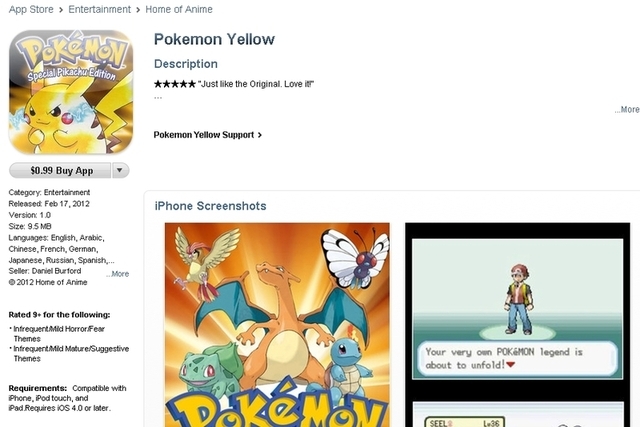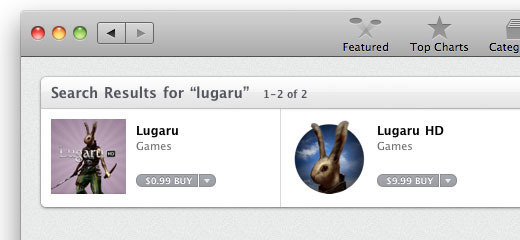
For years now industry wags have been saying Nintendo should get out of the portable hardware business and just bring its popular game franchises directly to Apple's iOS devices. So when an app called Pokemon Yellow appeared on the iOS App Store this weekend, many likely thought Nintendo had finally taken that advice. Those people would end up disappointed, though, as the 99 cent app, which is currently sitting at No. 3 on iTunes' paid apps charts, is actually an unauthorized copy posted by shady developer "House of Anime."
Of course, there's a long history of App Store developers taking a popular game concept, throwing on a legally distinct coat of paint, and quickly cashing in with a familiar "clone." But House of Anime's Pokemon Yellow is on an entirely different level than games that are merely "inspired" by popular titles, taking screenshots and characters from the Nintendo's title whole cloth.
House of Anime, the developer behind other highly questionable App Store entries like Digimon+ and YuGiOh+, claims in the app's description that "all trademarks and copyrights are owned by their respective owners," as if simply saying as much provides legal protection for outright IP theft. And despite the developer's claims that the game is "just like the original," highlighted one-star customer reviews suggest the app is a "scam" that doesn't even work after the title screen. (Interestingly, the developer has posted an apology for the performance issues on its website while totally ignoring the fact that the game is not, in fact, theirs to profit from).
Apple's role
How did such a a case of blatant IP theft get through the Apple's app review process? Quite easily, it seems. Apple doesn't appear to perform any sort of legal check before putting an app on the store, reviewing submitted apps primarily for technical issues. Instead, Apple relies on copyright holders to file a complaint once they notice the app is already on the store.
It's a somewhat understandable position for Apple; doing a comprehensive copyright search for every submitted app would put a ridiculous strain on reviewers that are already wading through dozens of new submissions every day. And even if you'd think a reviewer should notice that a game like Pokemon belongs to Nintendo even without such a search, that reviewer would still have no way of knowing (and likely no time to check) if House of Anime is an official licensee for the iOS version of the game.
The protection system, as it's currently designed, can and does work well—earlier this month, Apple took down dozens of blatant copycat games like Plants vs. Zombie, Numbers with Friends and Angry Ninja Birds from developer Anton Sinelnikov. Still, titles like Pokemon Yellow or others that illegally appropriate copyrighted games and characters manage to sneak through all the time, often surviving through obscurity or lack of legal will on the part of copyright holders.
Will the real Lugaru please stand up?

Even after the fact, figuring out the legal status of an app isn't always so simple. Last year, third-party developer iCoder created its own version of Wolfire Games' Lugaru HD, and started selling the game as plain old Lugaru on the Mac App Store, at a price significantly less than the "official" version. But iCoder was adamant it had done nothing wrong, telling Kotaku at the time it believed it was allowed to port and sell the game, which Wolfire had released earlier under an open source license.
"While we do understand [Wolfire's] regrets, this does not change the fact that we have every legal right to market and sell the software, and we feel that $1.99 is a fair price. ... The license we were granted allows for non-exclusive redistribution of the source code or the compiled product, modified or unmodified, for a fee or free of charge."
Luckily for Wolfire, the GPL license for the open source version of Lugaru let the company maintain rights to game assets like art and sounds, giving the company a valid claim against the iCoder version. Apple eventually pulled Lugaru off the App Store, but not before the unofficial release had reached No. 60 on the Mac App Store charts.
And therein, perhaps, lies the lesson in all this for Nintendo. If even a broken, unlicensed version of a decades-old Pokemon game can make it to the third position on the iOS App Store over the course of a weekend, imagine what a sensation a real, new Pokemon game would be on Apple's devices. Sure, it might cost Nintendo a few 3DS hardware sales, but why continue to struggle building an audience for your own mobile platform when Apple already has an established device with an audience that's obviously desperate for your software. In other words, why continue to try and beat the IP thieves when you can, instead, join them?
Listing image by Photograph by iTunes
reader comments
109